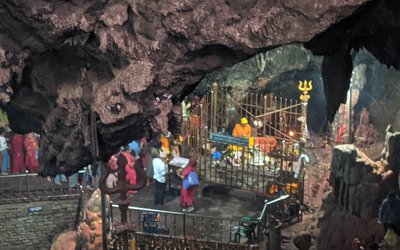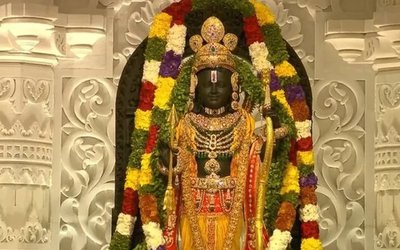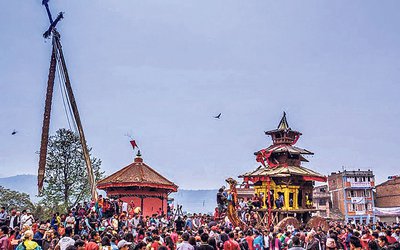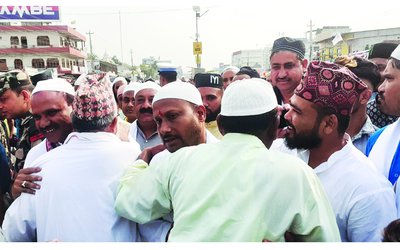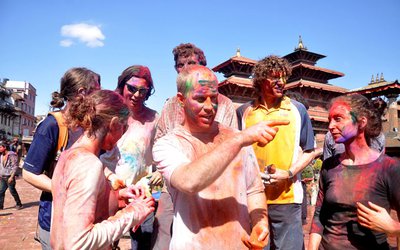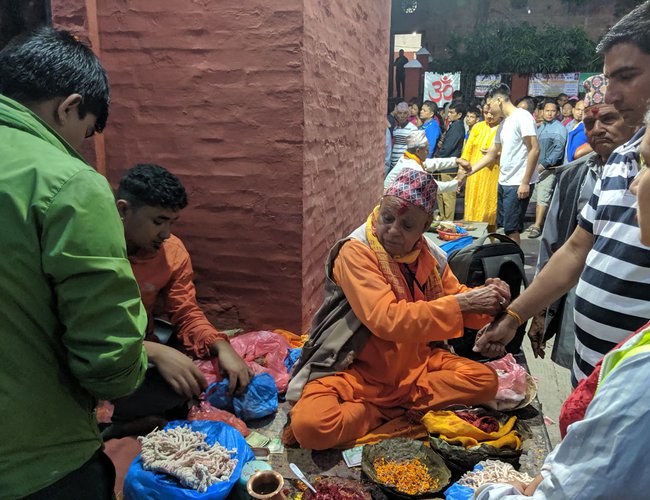
Janai Purnima is Hindu festival celebrated by almost every family of Nepal. However, different communities have their own way to celebrate. According to Nepali Calendar, this festival falls on the full moon day of Shrawan or Bhadra month. This year it falls on August 3.
On this day Shamans of the valley and around Nepal gather to perform their ancient rites in places like the Kumbeshwar in Patan, Gosaikunda in Langtang and Charikot in Dolakha.
On the occasion, ‘Tagadhari Hindus’ change the Janai — the sacred thread– after having their hair shaved and taking holy dips in ponds and rivers. The Hindus also receive Raksha Bandhan – thread around wrist — from priests. According to the widespread belief, the Raksha Bandhan is purified by mantras from Vedas and thus is regarded as a symbol of protection.
The festival is also known as Shrawani Purnima, Kwati Purnima, Rishi Purnima and Rakshya Bandhan.
In the Valley, devotees worship Lord Shiva at Pashupatinath and Kumbheswor in Lalitpur. Religious fairs are also held in Gosaikunda in Rasuwa, Triveni in Jumla, among others Hindu shrines. People living in the Tarai region, celebrate this day as the Rakhi festival for strengthening a bond of love between sisters and brothers.
Janai Purnima is one of the most sacred and important festivals of Hindu religion. The festival celebrates the bond of pureness and security. Janai means holy thread and Purnima is the full moon. On this day, Hindu Nepalese men of Brahmin and Chhetri perform their annual ritual of changing Janai.
Janai is a sacred thread made of cotton worn across the chest by Hindu men, especially Brahmin and Chhetri. They change this sacred thread after taking a bath in the rivers and pond. Brahimin perform Tarpan To Rishis early in the morning in the pond and rivers. It is a Vedic practice which refers to an offering made to divine entities.
They take a bath and makes their offering to Saptarishis (seven legendary rishis or sages) and their departed fathers and ancestors, then Tagadharis (Hindu men wearing the Janai) put the new Janai with a belief of having complete over body, speech, and mind.
In Janai, there are three cords, which symbolize body, speech, and mind and when the three knots have tied the one who wears is supposed to have gained completed control over each of the symbol.
Other people who are not wearing Janai, wears a sacred colorful thread called “Doro” around the wrist from Pundits (priest). There is a belief that sacred thread is worn for safety and protection. The thread is tied in the tail of cow on the third day of Tihar festival. This ritual is done for the safe passage to the heaven after death. It is believed that after a person dies, he/she would hold on to the tail of the cow as the cow pulls across to the Baitarni River.
Kwati Purnima/Gun Punhi
Janai Purnima is also called as Kwati Purnima or Gunhi Punhi. The Newar Community of Nepal mostly celebrates Kwati Purnima. However, nowadays every house celebrates this festival.
On this day, a special dish called Kwati is prepared and is consumed as a feast with the rest of the family as a celebration. Kwati is a soup made from a mix of nine different types of sprouted beans. The nine different beans used while making Kwati commonly includes black gram, chickpea, field bean, soybean, green gram, field pea, garden pea, cowpea and rice bean. The beans are soaked for three to four days in water until the time they sprout. They are cooked with various spices to make a thick soup.
This dish is consumed on the festival of Gun Punhi, the full moon day Gunla. Gunla is the tenth month of the Nepal Era lunar calendar. It is eaten as a delicacy and for health benefits and ritual significance.
Rakshya Bandhan
Raksha Bandhan or Rakhi is another festival of this day celebrated especially in Terai region of Nepal by Hindu and Jain. This festival is also celebrated throughout India. Raksha Bandhan means “bond of protection,” Raksha means “protection,” and Bandhan means “bond.”
They regard Raksha Bandhan is the festival of brother and sister. In this day, sisters meet her biological brothers, cousins or adopted brother-like friends and tie rakhi on her brother’s wrist. Rakhi is a colorfully woven bracelet. After rakhi, brothers and sisters pray together.
Then sisters apply tika (colorful mark) on brother’s forehead and perform an aarti wishing him a long and healthy life. In return, the brothers take promises to protect his sister and take care of her in all the circumstances. They also give gifts and money to sisters as a token of love and feed each other with sweets, fruit, and other delicious foods.
Legend Behind The Festival
One of the oldest festivals in India and Nepal , Raksha Bandhan, also referred to as ‘Rakhi’ is a day that celebrates the bond and the love between a brother and a sister, or siblings in general. The words ‘raksha bandha’ literally mean the ‘the bond of safety and security’ that siblings promise each other, no matter the circumstances. While the dates vary each year, it is normally celebrated around this time of the year. This year, it falls on August 3, which is a Monday.
Hindus around the world believe that the festival has much historical and mythological significance. In Mahabharata, when Lord Krishna had cut his finger while using his divine discus, Draupadi had dressed up his wound using the loose end of her saree. Thus, he had promised to protect her always, and he had kept his word especially during her public humiliation in the Hastinapur royal court.
- Kathmandu Chronicle: Reclaiming India-Nepal Relations
- Apr 20, 2024
- India Provided Financial Support To Build Schools In Darchula
- Apr 20, 2024
- Iranians Protest After Attack
- Apr 20, 2024
- Weather Forecast: Light Rain Is Likely To Occur At Few Places In Koshi, Bagmati, Gandaki And Karnali Provinces
- Apr 20, 2024
- Japanese Ambassador Kikuta And DPM Shrestha Shared The Views to Deepen Nepal-Japan Bilateral Relations
- Apr 19, 2024

